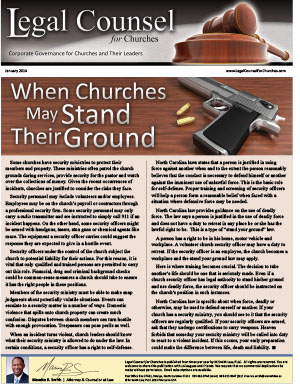All churches have a business side to their operation. As businesses, churches keep records on a number of subjects. Sometimes churches struggle with what right do its members have to see certain records.
Some church records may be considered too sensitive to release to the public. Such records include employees’ salaries, congregant financial records and sensitive strategic plans. When a church member asks to see church records, a church may have concerns about how to safeguard confidential subject matter. Churches should discuss and develop a policy that addresses ways to prevent public disclosures of private matters.
North Carolina law provides that church records are subject to inspection by its members. This right is not unlimited however. The right to inspection comes with a qualification. The right to inspection must be for a “proper purpose.” Courts have said that idle curiosity is not a proper purpose. Also, some private information may be redacted from members’ view.
There is a public relations issue to consider in all this. Once the public gets hold of the notion that the church is hiding some of its actions, members could become suspicious. If a loud cry comes from members for more disclosure, this could be a publicity problem.
If church members insist on seeing records, the church could ask the member to sign a nondisclosure agreement. This is not foolproof however. In an era of WikiLeaks, social media and whistleblowing, you should assume any information disclosed to a member could be widely distributed.
Church leaders should consider if their bylaws and policies address the rights its members have to records. If so, management should follow these guidelines. If the church has no internal guidance on record disclosures, it may be a good idea to develop a policy.
Respecting members’ legal right to the inspection of church records is wise. Having an established procedure for handling requests is prudent.

